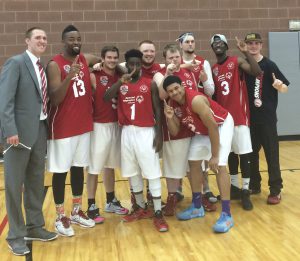
TUSCALOOSA, Ala. — Add The University of Alabama’s Unified Special Olympics team to its ever-growing list of national champions.
Special Olympics College at UA, a Unified Sport student club, won the National Intramural-Recreational Sports Association Unified Basketball championship recently, edging Central Michigan 51-43 in Columbus, Ohio to capture the division’s first-ever title.
The Unified division is a partnership between NIRSA and Special Olympics. Unified Sports is a burgeoning, inclusive sports initiative in which teams must have at least 50 percent young adults with intellectual disabilities and the offset from typical students enrolled at UA.
UA was led in scoring by Jonathan Gordon with 11 points, while Travis Bligh, a partner, scored 15. Roderick Patton had 10 points.
“This was NIRSA’s first time opening its doors to a Special Olympics event at a NIRSA National Championship Tournament,” said Ivan Bailey, a sophomore education major and partner for UA Special Olympics. “The experience for everyone involved was overwhelming, and the payoff was great for the athletes and students since this was our first year of basketball.”
UA Special Olympics started three years ago under the guidance of Brad Gardner, a senior aerospace engineering major from St. Louis, Missouri. Gardner played club water polo during his freshman year, and he and his teammates formed a volunteer partnership with Miracle League in Northport, a sports league for children with physical and intellectual disabilities.
There, he was approached by a representative of Special Olympics and asked to arrange a unified flag football game. The simple request grew from a community event to an on-campus match against LSU during the week of LSU-Alabama football game in 2013.
“The next semester I started special Olympics College here,” Gardner said. “Now we’re about 400 college students and 30 athletes with different levels of involvement from UA faculty. That game really set the tone for what Unified Sports can be here.”
The competitive component has been rooted since Day 1, but the program also has more casual field days, where anyone over the age of 18 from the Tuscaloosa-area can meet and play sports at UA. Several students in CrossingPoints, a UA-based transition program for students in city and county schools who have disabilities, participate in UA Special Olympics’ competitive and non-competitive sports.
“What we’d like to do is have our athletes and our UA students who are involved to meet every week for pick-up games,” said Bailey, who will take over as UA Special Olympics president in the fall. “Hopefully we can continue to build the community aspect.”
UA Special Olympics has played a rematch of the unified flag football game against LSU and has faced Auburn in the last two years. Additionally, two players – Roderick Patton and Kemondre Taylor – won a Special Olympics title in unified volleyball in Los Angeles in 2015. There’s plenty of room to grow, both in Tuscaloosa and throughout the country, Gardner said.
Most schools in the Southeastern Conference’s Western Division have had existing Special Olympics programs but have recently added unified sports, Gardner said. He has set his sights on creating a Unified Sports tournament for SEC West schools, a project that was inspired by the success of the initial flag football game against LSU. Both Gardner and Bailey will be back in Tuscaloosa this summer to further build the program.
“What’s so great about unified is not only does it push the athletes to perform at a higher level, but it shows they can go out there with a college student and have the same talent and ability,” Gardner said. “It builds a friendship that lasts on and off the field and builds greater confidence.”
Contact
David Miller, media relations, 205/348-0825, dcmiller2@ur.ua.edu
Source
Dr. Jim Siders, department head, special education, 205/348-6527, jsiders@ua.edu
